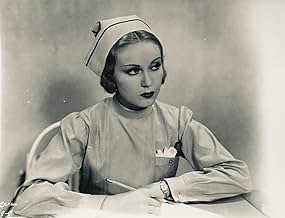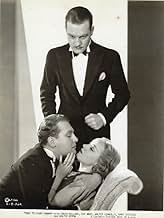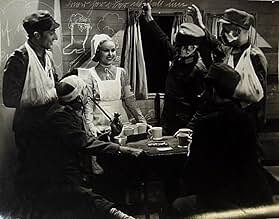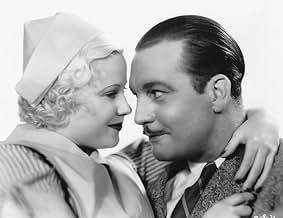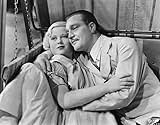During a number of bizarre cases, a dedicated nurse finds love with one doctor while she resents another new doctor who is extremely talented.During a number of bizarre cases, a dedicated nurse finds love with one doctor while she resents another new doctor who is extremely talented.During a number of bizarre cases, a dedicated nurse finds love with one doctor while she resents another new doctor who is extremely talented.
Sheila Darcy
- Gail Drake
- (as Rebecca Wassem)
Leila Bennett
- Sally
- (as Leila Bennet)
Edmund Burns
- Interne
- (uncredited)
Pat Flaherty
- Interne
- (uncredited)
- Director
- Writers
- All cast & crew
- Production, box office & more at IMDbPro
Featured reviews
Ralph Bellamy and Fay Wray shine as an up and coming and acclaimed surgeon and the head nurse of a hospital ward, respectively.
The film, courtesy of director Lambert Hillyer, fuses romantic melodrama, hospital drama and moral tales most effectively as the film plot moves seamlessly between them.
There are a few moments that we get some information and a scene that are there simply for atmosphere (one of the hospital patients, to be specific) and ultimately don't come back to have any bearing on the plot.
But those are far outweighed by subplots that do indeed have major effects on the main plot, and are done organically and most effectively.
Walter Connolly powerfully plays the head surgeon who has his own set of problems and arc that lends moral and touching weight to the film.
Being pre-code, it explores tensions of a sexual nature in ways that only a few months later wouldn't have been possible under the Hays Code, and that's one of the reasons it stands out. The other is, it often takes what the cliché of the drama would have been, and does the opposite.
This film deserves more recognition and it's a major disservice that it has never had a home video release. Here's to hoping!
The film, courtesy of director Lambert Hillyer, fuses romantic melodrama, hospital drama and moral tales most effectively as the film plot moves seamlessly between them.
There are a few moments that we get some information and a scene that are there simply for atmosphere (one of the hospital patients, to be specific) and ultimately don't come back to have any bearing on the plot.
But those are far outweighed by subplots that do indeed have major effects on the main plot, and are done organically and most effectively.
Walter Connolly powerfully plays the head surgeon who has his own set of problems and arc that lends moral and touching weight to the film.
Being pre-code, it explores tensions of a sexual nature in ways that only a few months later wouldn't have been possible under the Hays Code, and that's one of the reasons it stands out. The other is, it often takes what the cliché of the drama would have been, and does the opposite.
This film deserves more recognition and it's a major disservice that it has never had a home video release. Here's to hoping!
"Once to Every Woman" was an enjoyable hospital drama. You had your hospital romance, old school versus new school, an important procedure, and a medical emergency. It was probably just another episode of "ER" for some folks, but it was new to me.
At an anonymous hospital Dr. Walter Selby (Walter Connolly) was the main surgeon. He was widely regarded as the best surgeon in the country, but he was older now. His pupil and assistant, Dr. Jim Barclay (Ralph Bellamy), respectfully considered himself a better surgeon. He wasn't arrogant about it, he simply believed that Dr. Selby's methods and methodology were old and in need of updating. They particularly disagreed on how to handle a benign tumor in a woman's brain.
Running concurrent with that story was that of Nurse Mary Fanshawe (Fay Wray) and her love life. She wasn't a nurse totally consumed with the love of her life, she was too professional for that. In fact, she was so professional she couldn't bring herself to fire an incompetent nurse. She wanted to be sure that she was discharging the nurse for professional reasons and not personal ones. The nurse, Nurse Doris Andros (Mary Carlisle), was a hot blond who Dr. Preston (Walter Byron) couldn't keep his eyes off of. Dr. Preston just so happened to be the man Nurse Fanshawe was in love with.
It was a solid movie. I like that they didn't overly-dramatize the romance. The last thing I care to see in a hospital drama is a romance. It's a hospital; stick to saving lives and helping patients. "Once to Every Woman" had enough drama with two of the patients and the professional feud between Dr. Selby and Dr. Barclay.
Free on YouTube.
At an anonymous hospital Dr. Walter Selby (Walter Connolly) was the main surgeon. He was widely regarded as the best surgeon in the country, but he was older now. His pupil and assistant, Dr. Jim Barclay (Ralph Bellamy), respectfully considered himself a better surgeon. He wasn't arrogant about it, he simply believed that Dr. Selby's methods and methodology were old and in need of updating. They particularly disagreed on how to handle a benign tumor in a woman's brain.
Running concurrent with that story was that of Nurse Mary Fanshawe (Fay Wray) and her love life. She wasn't a nurse totally consumed with the love of her life, she was too professional for that. In fact, she was so professional she couldn't bring herself to fire an incompetent nurse. She wanted to be sure that she was discharging the nurse for professional reasons and not personal ones. The nurse, Nurse Doris Andros (Mary Carlisle), was a hot blond who Dr. Preston (Walter Byron) couldn't keep his eyes off of. Dr. Preston just so happened to be the man Nurse Fanshawe was in love with.
It was a solid movie. I like that they didn't overly-dramatize the romance. The last thing I care to see in a hospital drama is a romance. It's a hospital; stick to saving lives and helping patients. "Once to Every Woman" had enough drama with two of the patients and the professional feud between Dr. Selby and Dr. Barclay.
Free on YouTube.
"Once To Every Woman" is a very dated film because it seems to hold all the oldest themes a hospital soap opera can bear. The characters are the most standard possible: the up-and-coming hot shot surgeon, the older, set-in-his ways doctor that mentors him, the tough but beautiful, implausibly young head nurse, the flirtatious, unserious nurses that only cause trouble, and the classic patients and their mini-dramas.
The heart of the story is, much like in the Dr. Kildare flicks, the young doctor has some new young medical techniques the old one resists and resents until a crisis changes everything.
It's an easy enough film to watch, with a great cast, and it's always a pleasure to see new samples of their work, but this is all timeworn material. The dialogue is almost a parody of a radio doctor sudser, with people conversing in story expositions and character descriptions.
Nurse Mary Fanshawe (Faye Wray) is the supervisor of nurses at a hospital . She's got two surgeons after her - Dr. Jim Barclay (Ralph Bellamy) and Dr. Freddie Preston. She prefers Preston, and that's too bad because he is not serious about his profession and not really serious about Mary since he sneaks off with nurse Doris Andros for a make out session anytime that he can.
The head surgeon, Dr. Walter Selby (Walter Connally) is planning to do brain surgery on a young female patient there, but what he's planning to do is a half measure. Dr Barclay wants to do something a bit more daring - as in more modern - that will completely cure the patient, but Selby is against it.
So it's these two conflicts that comprise most of the short running time of this B hospital drama - old versus young surgeon, and slipshod versus dedicated surgeon. In between there's drama in the woman's ward at the hospital as their guests come and go. One guest is actually the person who put the woman in the hospital, her husband.
There's nothing really precode about it, though it does have its saucier moments, such as when Doris says about Dr. Preston - "The M. D. in his name means more dames!"
It's worth a look if you are interested in old 30s films.
The head surgeon, Dr. Walter Selby (Walter Connally) is planning to do brain surgery on a young female patient there, but what he's planning to do is a half measure. Dr Barclay wants to do something a bit more daring - as in more modern - that will completely cure the patient, but Selby is against it.
So it's these two conflicts that comprise most of the short running time of this B hospital drama - old versus young surgeon, and slipshod versus dedicated surgeon. In between there's drama in the woman's ward at the hospital as their guests come and go. One guest is actually the person who put the woman in the hospital, her husband.
There's nothing really precode about it, though it does have its saucier moments, such as when Doris says about Dr. Preston - "The M. D. in his name means more dames!"
It's worth a look if you are interested in old 30s films.
Ralph Bellamy and Walter Connolly are doctors in the hospital; Fay Wray is Mary, a nurse in the ward. similar to a hospital drama show, but this one is different; the nurses tell the doctor what to do, the younger docs tell off the older docs, and everyone is making out. There were two earlier silent films Once to every Man and the first version of One to every Woman, but they don't seem to be related to this story at all. Bellamy had only been around a couple years at this point. Fay Wray was an old pro in hollywood, and had just finished making the king sized King Kong. Directed by Lambert Hillyer. he directed a zillion westerns, silent and talkers. This one is okay. it moves pretty slowly. the career paths of the people in it are much more interesting than the actual story line.
Did you know
- TriviaAlthough the title card bears a 1933 (MCMXXXIII) copyright statement, it was not copyrighted or released until 1934.
- GoofsWhen the nurse hands Fanshawe the evening's report, the nurse then puts her right hand behind her right leg. But on the next cut, as Fanshawe reads the report, she now has her right hand in front of her and resting on the desk.
- Quotes
Mary Fanshane: I guess I'm immune.
Dr. Barclay: Against what?
Mary Fanshane: Against this silly business called love.
Details
- Release date
- Country of origin
- Language
- Also known as
- Skæbner paa Stue K
- Production company
- See more company credits at IMDbPro
- Runtime1 hour 10 minutes
- Color
- Aspect ratio
- 1.37 : 1
Contribute to this page
Suggest an edit or add missing content


